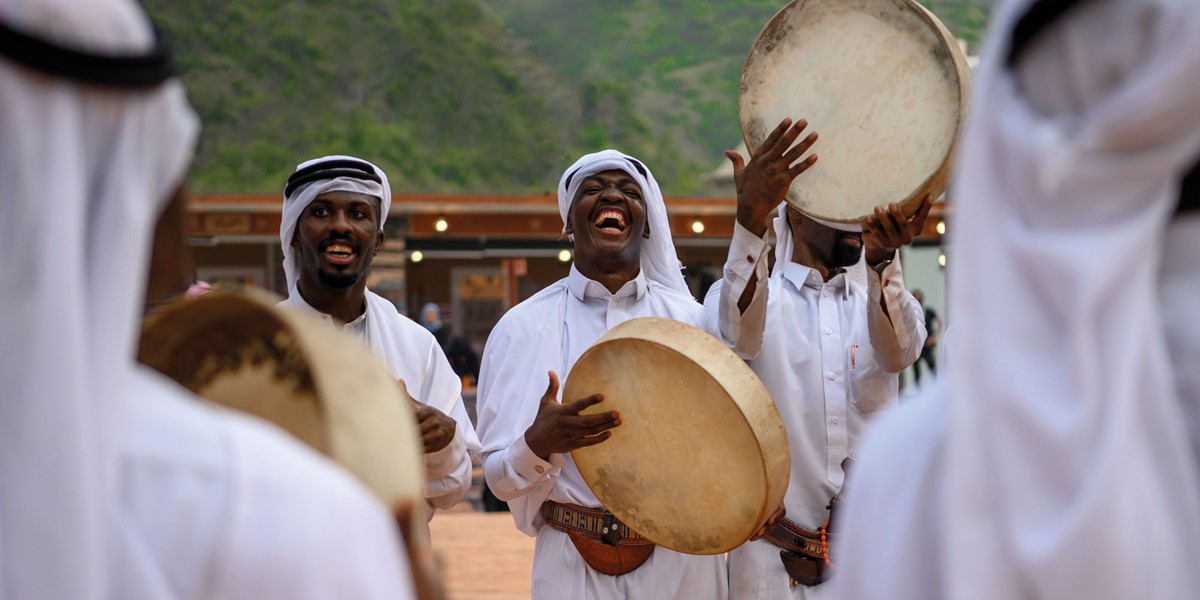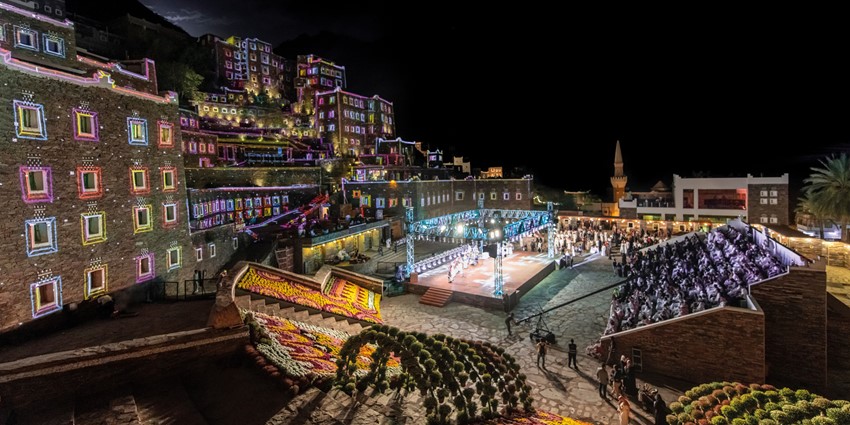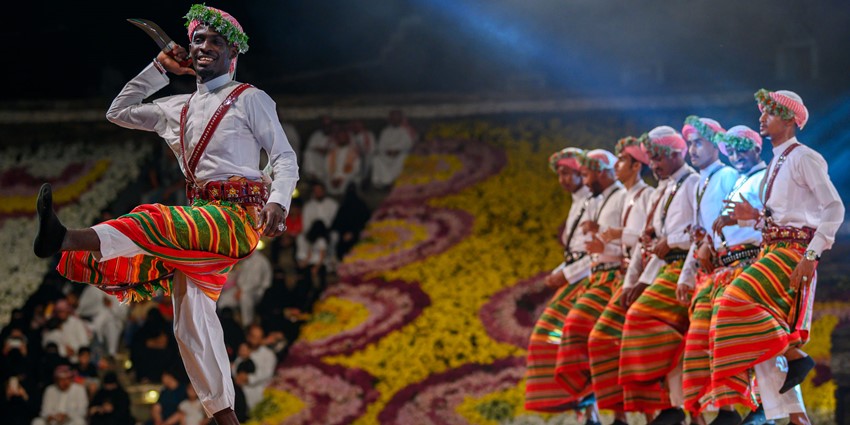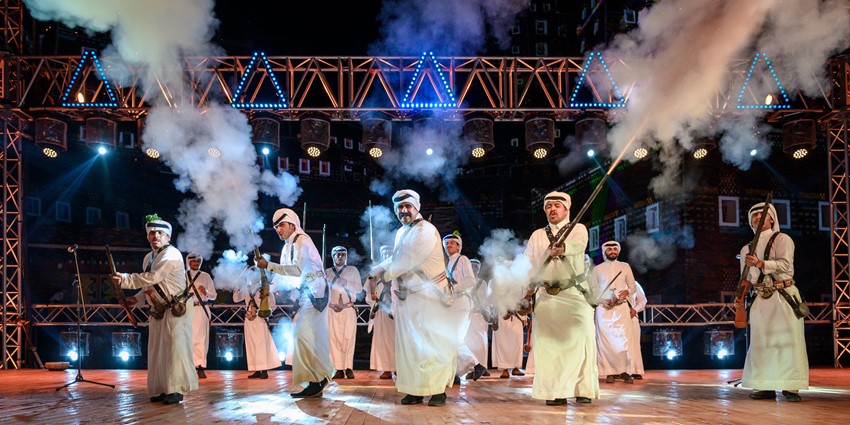Wednesday, December 18, 2019
The Flower Men of Saudi Arabia
Saudi Arabia has been making headlines, largely for its war on Yemen and the high-profile murder of journalist Jamal Khashoggi. But now the kingdom is on a PR offensive, launching a tourism initiative. Simon de Bruxelles visits one of its new festivals

Photos: Saudi Ministry of Culture
Unless you’ve been on the hajj pilgrimage or are in the military or the oil industry, you probably know more about the dark side of the moon than you do about the remote Saudi Arabian region of Asir. Situated in the south-west of the country, just 100km from the border with Yemen, Asir’s landscape is unlike anywhere else in Saudi Arabia, with mountains rising to 3,000m and dozens of ancient stone villages. While the cities of Riyadh and Jeddah fry in temperatures of up to 50°C in summer, the mountains of Asir are shrouded in mist and washed by occasionally torrential rain.
Music is something that Saudis love but for much of the past 40 years have rarely been allowed to enjoy in public. Nowhere is that more evident than in Asir, a region that gave birth to a unique culture that has preserved traditions of music and dance unchanged for centuries. The colourful culture of the Qahtani tribe, known as the Flower Men because of the garlands of yellow and orange flowers they wear on their heads, is largely unknown to the outside world.

Photos: Saudi Ministry of Culture
All that is about to change. Saudi Arabia, or the Kingdom as it is known, is now enticing international visitors with a series of annual festivals called ‘Seasons’ and the development of at least one resort on the Red Sea. The encouragement of tourism is among the reforms introduced by Saudi Arabia’s Crown Prince Mohammed bin Salman, known as MbS. The liberalisation he has initiated has seen the opening of cinemas for the first time in 40 years, live music concerts and the loosening of restrictions on women. The changes are partly an acceptance that sooner or later the country will need to supplement its income from oil and partly a relaxation of some of the more repressive rules about what people can and cannot do. It is also, after years of opprobrium for human rights abuses, a way of presenting a friendlier, more welcoming face to the world. This, of course, is at odds with the fact that Mohammed bin Salman is currently provoking international outrage for the ongoing war in Yemen, which has led to the deaths of tens of thousands of civilians, and the sanctioning of the cold-blooded murder of Saudi journalist and vocal critic of the state Jamal Khashoggi in the Saudi embassy in Istanbul.
The Al-Soudah Season made its debut in August. Named after Asir’s Black Mountain, the country’s highest peak, it features a three-week-long celebration of the Flower Men’s music, traditional dress and dance.
New tourist visas will allow visitors from more than 50 countries to experience a culture that until recently was physically as well as politically out of reach. The more remote villages were only accessible by rope ladders, placed up hazardous mountainsides as a defence against marauders. A cable car and road constructed in the 1990s by the Saudi government made them reachable at the same time that the Flower Men were being relocated to the modern accommodation in the town of Habala, only returning to their ancient villages to perform for the benefit of tourists.

The Flower Men we meet seem to welcome the chance to show off to outsiders. They wear calf-length skirts woven with colourful horizontal stripes, their hair and beards dyed red with henna, and each carries a long knife tucked into his waistband. The garlands worn by both men and women are not just for display. The wreaths of marigolds, thyme, basil and other herbs and flowers are supposed to have health-giving properties and also scent the air.
The traditional music of Saudi Arabia was strongly influenced by the nomadic lifestyle of its inhabitants who drove their flocks across the peninsula according to the seasons. As it was not possible to transport large, delicate instruments, drums, flutes and smaller stringed instruments dictated the type of music that was played. Rhythmic clapping and vocal chanting do not require instruments and are still a key element of the Flower Men’s performances. Among the most popular of the other instruments is the ney, a flute that has been played for at least 4,000 years.
The most popular dance is known as the southern Ardah, a variation of a war dance that is performed all over the peninsula and the Gulf. The dancers, all male, form two lines facing each other, and repeat verses spoken by a leader to the accompaniment of tambourines or drums.

Photos: Saudi Ministry of Culture
Their music and dance are related to other tribal traditions in the Arabian Peninsula but are uniquely colourful. The dances involve rhythmic clapping, chanting and jumping accompanied by flutes, horns and a three-stringed instrument similar to the oud. Traditional songs range from serenades and laments sung by lonely herdsmen to war songs to psych up the men for battle. The rhythms are unmistakably Arabian with the joyous release of a celebration after days of toil in the rocky mountain terraces, where many of the Flower Men still spend their days. None of the performers are professional musicians, but are farmers, drivers, teachers, soldiers and clerks who grew up learning the steps almost before they could walk.
Some traditional Asir dances were banned by fatwa, or religious edict, as recently as 2015, as some of the performers are alleged to imitate women. The fatwa, issued by the mufti of Asir, was criticised by Mohammed Al-Nujaim, a professor at the Superior Institute of Justice, who said: ‘All fatwas should be issued in light of the Holy Qur’an and one should avoid weird fatwas from unknown scholars.’
The focus of the first Flower Men festival is the main square of the historic town of Rijal Almaa, overlooked by steep hillsides and dark towers. Nine different tribes put on displays over the three-week festival as a spectacular 3D lightshow is projected onto the ancient buildings. Rijal Almaa was once an important trading post where goods, brought from India and the Far East via the port of Aden, were sold before being carried on by camel train to the Middle East and North Africa.
The merchants of Rijal Almaa grew wealthy and 500 years ago began building fortified houses that crept up the hillside like Lego tower blocks. The rock towers are studded with pure white chunks of quartz, like sugar cubes. Thick walls and small square windows keep the heat out in summer and retain it in the winter. Inside the rooms are decorated with delicate murals painted with pigments extracted from local rocks.
Having been emptied of inhabitants, Rijal Almaa’s crumbling buildings are now being restored and the village is expected to be designated a UNESCO World Heritage site. The majority of the audience at the inaugural Flower Men festival is local, or Saudis who had come to Asir to escape the summer heat. Many Saudis spend the summer the same way as their nomadic forebears, in tents in the mountains where it is cooler. Red-bottomed baboons scavenge for food though most have been scared off by sonic deterrents. The road through the mountains is lined with stalls and vendors selling local pottery and mounds of fruit.
Saudi Arabia feels like one of the few places left that is truly undiscovered. Western visitors are still a novelty, and music and dance traditions that have vanished elsewhere are still being handed down from father to son. Many, particularly in the mountains, still remember when they were part of everyday life. In Rijal Almaa they recall with amusement how men and women used to dance together. It may not happen again any time soon but at least their unique mountain music has a secure future.
This article originally appeared in the December 2019 issue of Songlines. Never miss an issue – subscribe today!

